牛津译林版(2019)必修第二册Unit 4 Exploring literature Grammar and usage教案配套课件(共21张PPT)
文档属性
| 名称 | 牛津译林版(2019)必修第二册Unit 4 Exploring literature Grammar and usage教案配套课件(共21张PPT) | 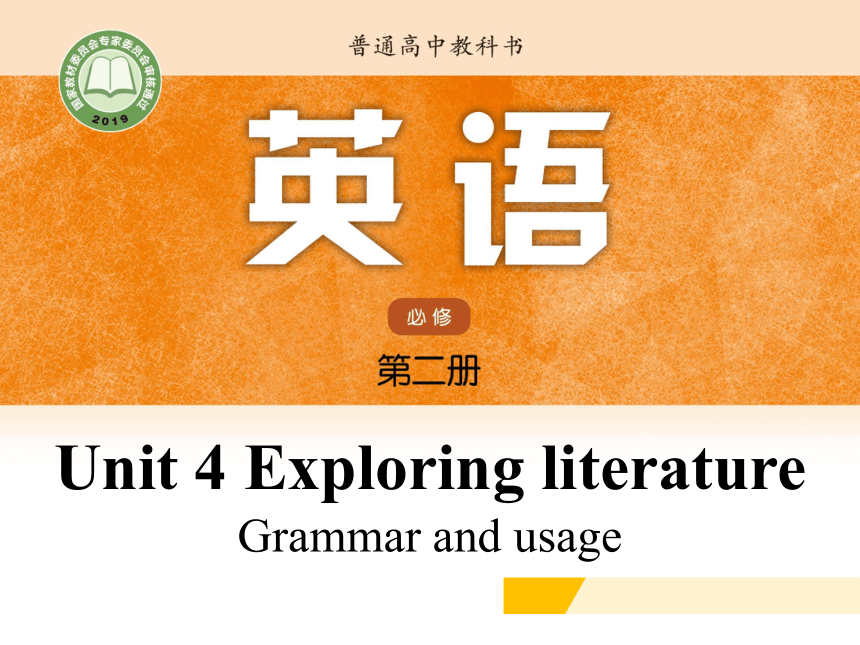 | |
| 格式 | pptx | ||
| 文件大小 | 6.3MB | ||
| 资源类型 | 教案 | ||
| 版本资源 | 牛津译林版(2019) | ||
| 科目 | 英语 | ||
| 更新时间 | 2022-12-28 15:04:23 | ||
图片预览



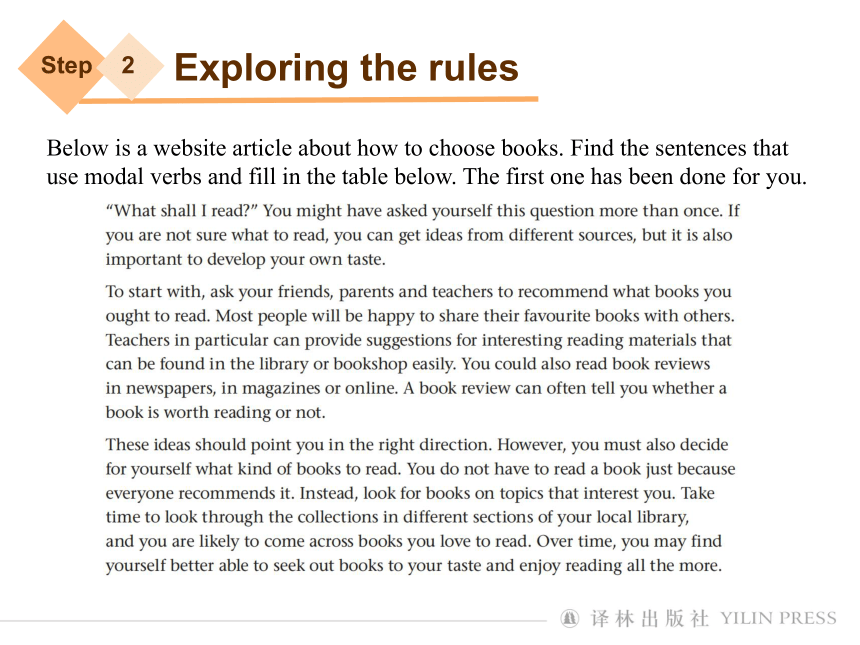
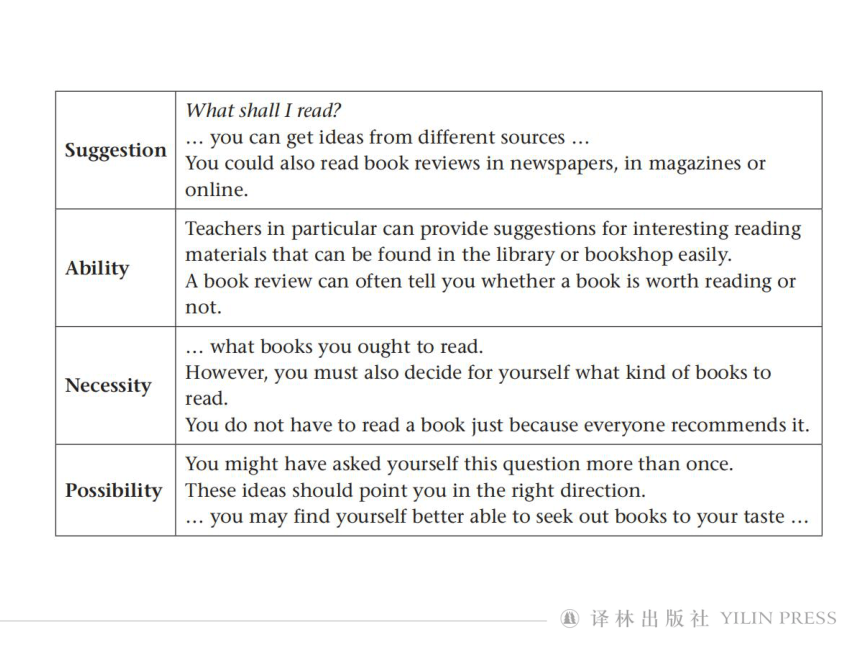
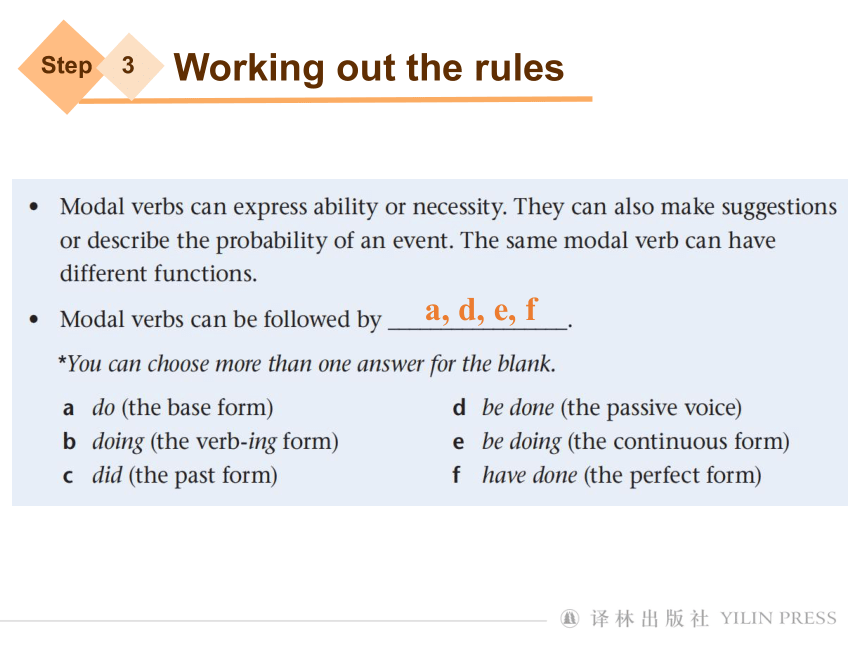

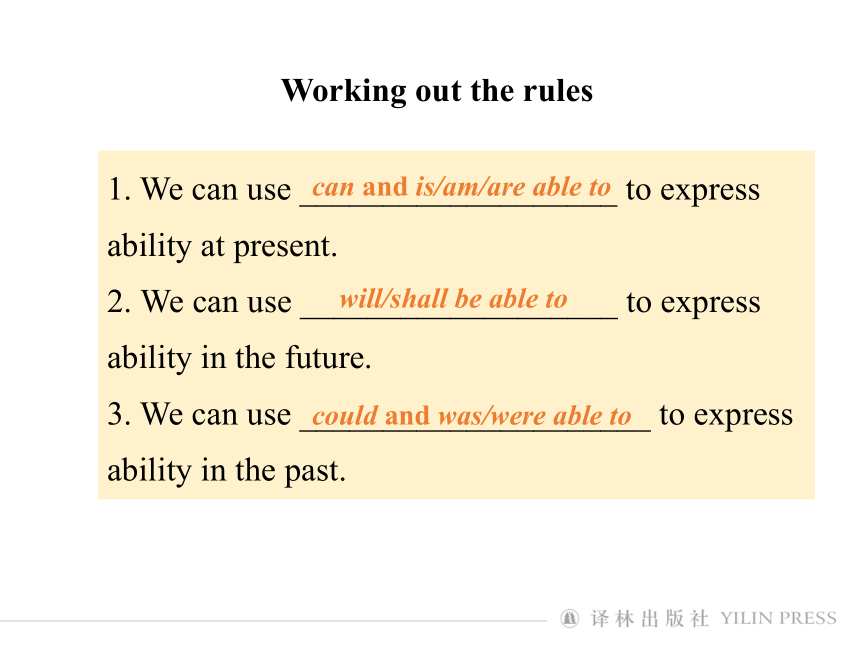
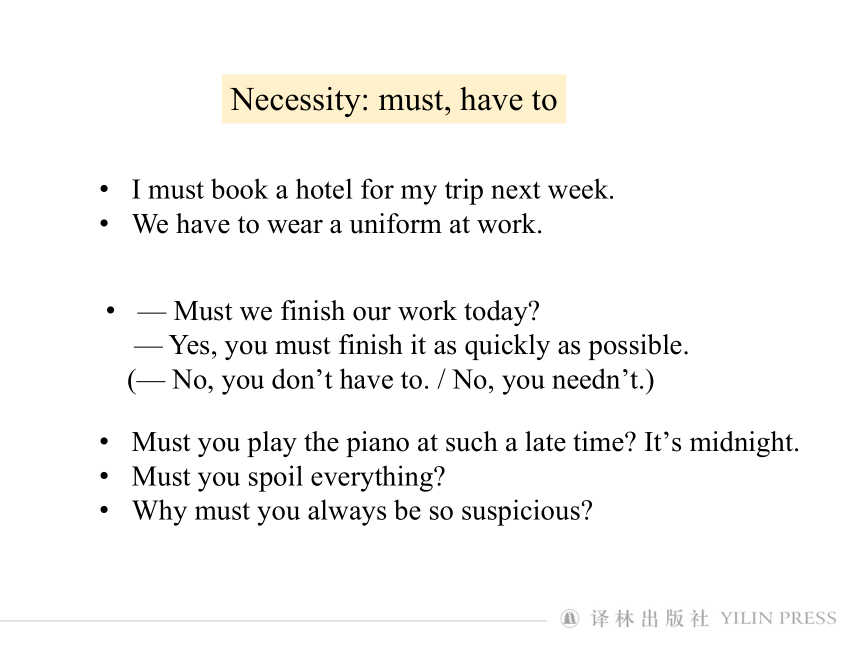
文档简介
(共21张PPT)
Unit 4 Exploring literature
Grammar and usage
Histories make men wise; poets witty; the mathematics subtle; natural philosophy deep; moral grave; logic and rhetoric able to contend.
—The Essays of Francis Bacon (1597)
by Francis Bacon
读史使人明智,读诗使人灵秀,数学使人周密,科学使人深刻,伦理学使人庄重,逻辑修辞之学使人善辩。
Lead-in
1
Step
How can we choose good books
Exploring the rules
2
Step
Below is a website article about how to choose books. Find the sentences that use modal verbs and fill in the table below. The first one has been done for you.
Working out the rules
3
Step
a, d, e, f
Exploring more about the rules
4
Step
Ability: can/be able to
Can you run 1,500 metres in five minutes
Even a small personal computer can store vast amounts of information.
Are you able to run 1,500 metres in five minutes
Will you be able to speak English fluently in five years
Jim could/couldn’t run fast when he was young.
He was able to drive when he was a student.
1. We can use ___________________ to express ability at present.
2. We can use ___________________ to express ability in the future.
3. We can use _____________________ to express ability in the past.
can and is/am/are able to
will/shall be able to
could and was/were able to
Working out the rules
Necessity: must, have to
I must book a hotel for my trip next week.
We have to wear a uniform at work.
— Must we finish our work today
— Yes, you must finish it as quickly as possible.
(— No, you don’t have to. / No, you needn’t.)
Must you play the piano at such a late time It’s midnight.
Must you spoil everything
Why must you always be so suspicious
1. We use _________ when we decides that something is necessary or needs to be done; we use _________ when somebody else other than us has made the decision.
2. To answer the question introduced by must, we use _________ for a positive answer, and ______________________ for a negative answer.
3. _________ can be used in questions to tell someone that their behaviour makes us upset or annoyed.
must
Working out the rules
have to
must
don’t have to/needn’t
Must
Applying the rules
5
Step
B1
For the following groups of three sentences, tick the sentence which uses the modal verb differently from the other two.
√
√
√
√
Choose proper modal verbs and use the proper forms to complete the sentences.
1. shall/will
(1) I have told him again and again to stop smoking, but he _________ listen.
(2) _________ you come with me to visit Uncle Bill
(3) _________ we start the project right now
2. must/need
(1) You _________ smoke in the hospital. It is bad for the patients.
(2) We _________ get up too early tomorrow morning.
won’t
Will
Shall
mustn’t
needn’t
3. can/be able to
(1) He _________ swim across the English Channel, but he didn’t feel like it that day.
(2) Mary _____________________ play the piano since she was 5.
4. should/ought to
(1) —I don’t care what people think.
—Well, you _________.
(2) Don’t ask me! How _________ I know
(3) Try phoning Mike—he _________ be home by now.
could
can/has been able to
should/ought to
should
should
Translate the following sentences into English.
1. 过马路时越小心越好。
You ___________________________ cross the road.
2. 凡事都有两面性。动听的歌曲有时候对别人来说就是噪声。
Everything has two sides. Beautiful songs, sometimes, ___________________________.
3. 我们学校的一个规定是每个学生在校期间都得穿校服。
One of our school rules is that every student _________________________________ while at school.
4. 我再也不会那样做了。
I ___________________________ that again.
can’t be too careful to
can/may be noise to others
has to/shall wear a school uniform
will/would never do
B2
Below is an entry in a student’s reading plete the entry with the correct modal verbs in the brackets.
can’t
must
could
must
can
should
ought to
(根据2016 全国卷II改编) Fill in the blanks with proper words.
If you feel stressed by responsibilities at work, you (1) _____________ take a step back and identify those of greater and less importance. Then, handle the most important tasks first so you’ll feel a real sense of (2) _____________ (achieve). Leaving the less important things until tomorrow (3) _____________ (be) often acceptable.
Most of us are more focused (4) _____________ our tasks in the morning than we are later in the day. So, get an early start and try to be as productive (5) _____________ possible before lunch. This (6) _____________ give you the confidence you need to get you through the afternoon and go home feeling accomplished.
should
achievement
is
on
as
will/can
Recent (7) _____________ (study) show that we are far more productive at work if we take short breaks (8) _____________ (regular). Give your body and brain a rest by stepping outside for a while, exercising, or doing something you enjoy.
If you find something you love doing outside of the office, you’ll be less likely (9) _____________ (bring) your work
home. It (10) _____________ be anything—gardening, cooking, music, sports—but whatever it is, make sure it’s a relief
from daily stress rather than another thing to worry about.
studies
regularly
to bring
could/can
B3
In pairs, make rules for your school library using modal verbs. Use the following examples to help you.
You must study quietly in the reading room.
You must not eat or drink in the library.
You can use the computers to find books in our library.
You can borrow two books at a time and keep them for as long as two weeks.
Books can enrich our life. Life without books is like a body without a soul.
Finish exercise C on page 76 of the textbook.
Write a notice for the school library, using the sentences you have written in class.
Homework
Unit 4 Exploring literature
Grammar and usage
Histories make men wise; poets witty; the mathematics subtle; natural philosophy deep; moral grave; logic and rhetoric able to contend.
—The Essays of Francis Bacon (1597)
by Francis Bacon
读史使人明智,读诗使人灵秀,数学使人周密,科学使人深刻,伦理学使人庄重,逻辑修辞之学使人善辩。
Lead-in
1
Step
How can we choose good books
Exploring the rules
2
Step
Below is a website article about how to choose books. Find the sentences that use modal verbs and fill in the table below. The first one has been done for you.
Working out the rules
3
Step
a, d, e, f
Exploring more about the rules
4
Step
Ability: can/be able to
Can you run 1,500 metres in five minutes
Even a small personal computer can store vast amounts of information.
Are you able to run 1,500 metres in five minutes
Will you be able to speak English fluently in five years
Jim could/couldn’t run fast when he was young.
He was able to drive when he was a student.
1. We can use ___________________ to express ability at present.
2. We can use ___________________ to express ability in the future.
3. We can use _____________________ to express ability in the past.
can and is/am/are able to
will/shall be able to
could and was/were able to
Working out the rules
Necessity: must, have to
I must book a hotel for my trip next week.
We have to wear a uniform at work.
— Must we finish our work today
— Yes, you must finish it as quickly as possible.
(— No, you don’t have to. / No, you needn’t.)
Must you play the piano at such a late time It’s midnight.
Must you spoil everything
Why must you always be so suspicious
1. We use _________ when we decides that something is necessary or needs to be done; we use _________ when somebody else other than us has made the decision.
2. To answer the question introduced by must, we use _________ for a positive answer, and ______________________ for a negative answer.
3. _________ can be used in questions to tell someone that their behaviour makes us upset or annoyed.
must
Working out the rules
have to
must
don’t have to/needn’t
Must
Applying the rules
5
Step
B1
For the following groups of three sentences, tick the sentence which uses the modal verb differently from the other two.
√
√
√
√
Choose proper modal verbs and use the proper forms to complete the sentences.
1. shall/will
(1) I have told him again and again to stop smoking, but he _________ listen.
(2) _________ you come with me to visit Uncle Bill
(3) _________ we start the project right now
2. must/need
(1) You _________ smoke in the hospital. It is bad for the patients.
(2) We _________ get up too early tomorrow morning.
won’t
Will
Shall
mustn’t
needn’t
3. can/be able to
(1) He _________ swim across the English Channel, but he didn’t feel like it that day.
(2) Mary _____________________ play the piano since she was 5.
4. should/ought to
(1) —I don’t care what people think.
—Well, you _________.
(2) Don’t ask me! How _________ I know
(3) Try phoning Mike—he _________ be home by now.
could
can/has been able to
should/ought to
should
should
Translate the following sentences into English.
1. 过马路时越小心越好。
You ___________________________ cross the road.
2. 凡事都有两面性。动听的歌曲有时候对别人来说就是噪声。
Everything has two sides. Beautiful songs, sometimes, ___________________________.
3. 我们学校的一个规定是每个学生在校期间都得穿校服。
One of our school rules is that every student _________________________________ while at school.
4. 我再也不会那样做了。
I ___________________________ that again.
can’t be too careful to
can/may be noise to others
has to/shall wear a school uniform
will/would never do
B2
Below is an entry in a student’s reading plete the entry with the correct modal verbs in the brackets.
can’t
must
could
must
can
should
ought to
(根据2016 全国卷II改编) Fill in the blanks with proper words.
If you feel stressed by responsibilities at work, you (1) _____________ take a step back and identify those of greater and less importance. Then, handle the most important tasks first so you’ll feel a real sense of (2) _____________ (achieve). Leaving the less important things until tomorrow (3) _____________ (be) often acceptable.
Most of us are more focused (4) _____________ our tasks in the morning than we are later in the day. So, get an early start and try to be as productive (5) _____________ possible before lunch. This (6) _____________ give you the confidence you need to get you through the afternoon and go home feeling accomplished.
should
achievement
is
on
as
will/can
Recent (7) _____________ (study) show that we are far more productive at work if we take short breaks (8) _____________ (regular). Give your body and brain a rest by stepping outside for a while, exercising, or doing something you enjoy.
If you find something you love doing outside of the office, you’ll be less likely (9) _____________ (bring) your work
home. It (10) _____________ be anything—gardening, cooking, music, sports—but whatever it is, make sure it’s a relief
from daily stress rather than another thing to worry about.
studies
regularly
to bring
could/can
B3
In pairs, make rules for your school library using modal verbs. Use the following examples to help you.
You must study quietly in the reading room.
You must not eat or drink in the library.
You can use the computers to find books in our library.
You can borrow two books at a time and keep them for as long as two weeks.
Books can enrich our life. Life without books is like a body without a soul.
Finish exercise C on page 76 of the textbook.
Write a notice for the school library, using the sentences you have written in class.
Homework
